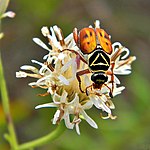Palafoxia integrifolia
| Palafoxia integrifolia | |
|---|---|

| |
| Scientific classification | |
| Kingdom: | Plantae |
| Clade: | Tracheophytes |
| Clade: | Angiosperms |
| Clade: | Eudicots |
| Clade: | Asterids |
| Order: | Asterales |
| Family: | Asteraceae |
| Genus: | Palafoxia |
| Species: | P. integrifolia
|
| Binomial name | |
| Palafoxia integrifolia | |
Palafoxia integrifolia, commonly known as the coastalplain palafox and coastal plain palafox, is a species of palafox native to the southeastern United States.
Description[edit]

Palafoxia integrifolia is a herbaceous annual plant with pinkish-white disc flowers arranged in inflorescences. It has glossy, alternating leaves which elongate on the lower portion of the stems and more linear at the top.[2] The stems of P. integrifolia are less woody than other species of palafox, making it prone to drooping.[2]
Taxonomy and etymology[edit]

Palafoxia integrifolia was described in 1842 by Thomas Nuttall. The generic name refers to José de Palafox y Melci,[3] while the species name is derived from the Latin word integrifolius, meaning "having entire leaves". Polypteris integrifolia is a valid synonym.[3]
Distribution and habitat[edit]
Palafoxia integrifolia is found in the states of Georgia and Florida, where it grows in sandy uplands.[2]
Ecology[edit]
Like other Palafoxia species, P. integrifolia is attractive to birds and insects, which aid in pollination.
References[edit]
- ^ "Plants Profile for Palafoxia integrifolia (Coastal plain palafox)". plants.usda.gov. Retrieved 2014-05-25.
- ^ a b c "Native Florida Wildflowers: Coastalplain Palafox - Palafoxia integrifolia". hawthornhillwildflowers.blogspot.com. Retrieved 2014-05-25.
- ^ a b "Lady Bird Johnson Wildflower Center - The University of Texas at Austin". wildflower.org. Retrieved 2014-05-25.
